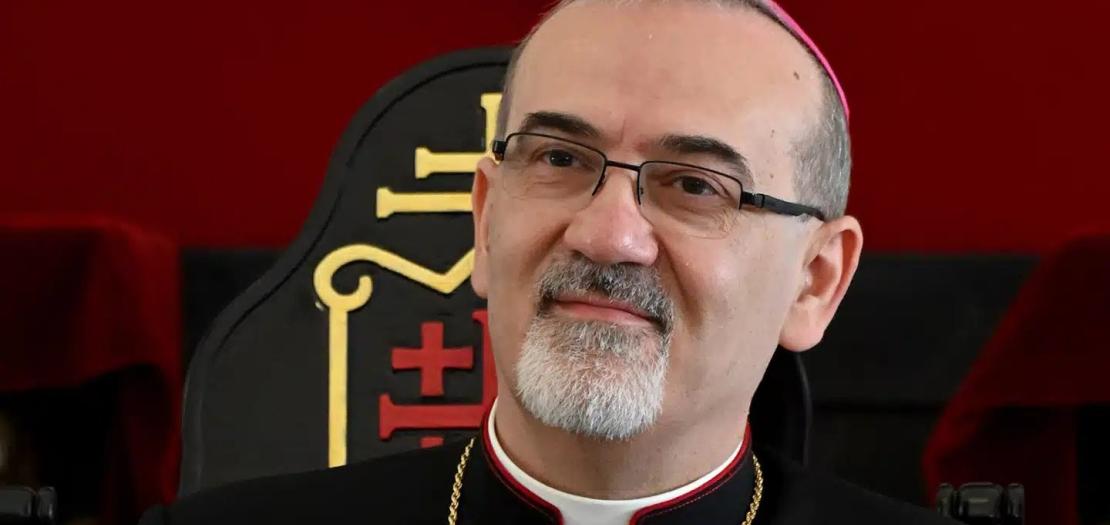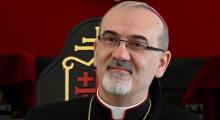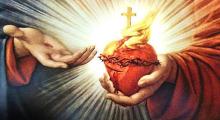Issued by the Catholic Center for Studies and Media - Jordan. Editor-in-chief Fr. Rif'at Bader - موقع أبونا abouna.org

In today’s Gospel passage, (John 16:12-15) we hear that when Jesus speaks of the Holy Spirit. He repeats a somewhat strange expression twice. For he says that the Spirit “will take what is mine and declare it to you.” (John 16:14,15)
To understand what Jesus is trying to tell us with this expression, let’s take a step back and come to an Old Testament passage where we see an opposite situation to what Jesus is talking about.
The passage in question is Genesis 3:1-12. God had just created man and entered into a dialog with him. The passage is well known: God hands over to man all the wonderful creation he has just made and, with the commandment about the tree of knowledge of good and evil, asks him to remain in a meek attitude, the attitude of a person who owns nothing but accepts everything as a gift. The filial attitude of a person who knows that he is not the master of everything.
At a certain point, however, the serpent appears and also enters into a dialog with the woman. The serpent takes up God’s words, but he does not do so with respect for God’s thinking. He adds his own words: small, insidious words that are enough to generate in the woman’s suspicion that God is different from what he had shown himself to be in the garden.
God had said that man may eat from all the trees in the garden except one “You are free to eat from any of the trees of the garden”; (Gen 2:16-17) the serpent asks if it is true that they should not eat from any tree in the garden (“Did God really say, ‘You shall not eat from any of the trees in the garden’?” - Gen 3:1). The words hardly change, but the meaning changes completely.
The serpent wants to separate humanity from its Creator, and he does this by speaking words that generate in the human heart a lie, a distorted image of God. But it is not just a distorted image of God. For it corresponds to a distorted image of man, who ceases to be a beloved creature and lives in guilt, in the deception of a man who must win back God's benevolence.
This image remains imprinted in the depths of human memory, and it spreads quickly, as only lies can do. Thus, man becomes unable to bear the burden of truth (“I have much more to tell you, but you cannot bear it now”, (John 16:12) and becomes a slave to a lie from which he alone cannot free himself.
What can bring people back to the truth about themselves, to the truth about God? This is what Jesus describes in today’s Gospel.
The Spirit does not do what the serpent did: he adds nothing to Jesus’ words and takes nothing away. He does not add his own to them, because he lives in the same reality as Jesus, because he knows that they are true words that are sufficient for man’s salvation. These words are also his own.
Then he can take them, because in the Trinity everything is common, and the Three Persons give honor to one another by taking from one another without fear. If everything is in common, I can take what belongs to the other and I take nothing away from him: in doing so, I confirm the truth of the communion that unites us.
For man, this way of living is a burden, a hardship: if someone takes something away from us, we feel inadequate, defrauded.
In the Trinity, it is the other way around. Then it is God’s work to slowly introduce us to this new way of living and thinking, that of communion.
The humanity that listens to the lying words of the serpent eventually finds itself isolated, poor and scattered.
The humanity that accepts the words of Jesus, which the Spirit takes up and makes come alive in us, finds the truth about itself and the truth about God. The truth of communion and mutual love that makes humanity rich in goodness, in relationships, in life.
This is the “things to come” of which Jesus speaks “the Spirit of truth, he will guide you to all truth. He will not speak on his own, but he will speak what he hears, and will declare to you the things that are coming” (John 16:13): it is given to us, but we must receive it every day; it stands before us as that which does not pass away, that which remains, even if everything else fails.
+ Pierbattista
 Holy Land: Bethlehem University Occupational Therapy students promote wellness at Lajee Center
Holy Land: Bethlehem University Occupational Therapy students promote wellness at Lajee Center  Meditation of Patriarch Pierbattista Pizzaballa: Solemnity of the Most Holy Trinity
Meditation of Patriarch Pierbattista Pizzaballa: Solemnity of the Most Holy Trinity 




